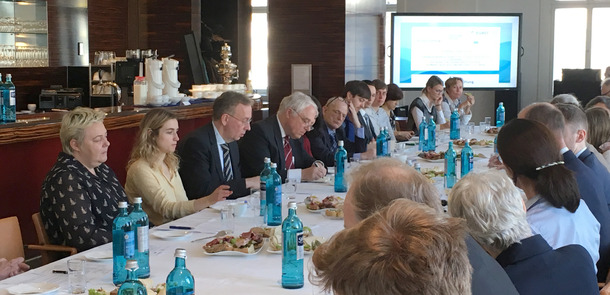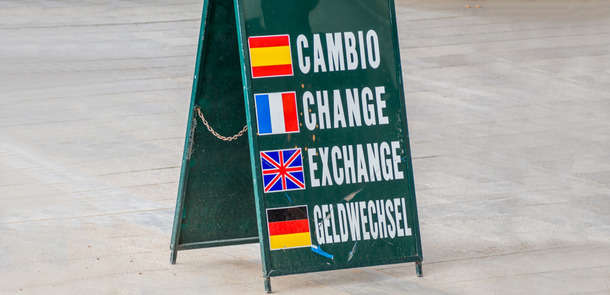On DATE, in advance of the fourth round of negotiations on a free trade agreement and deeper economic integration between the EU and Tunisia, 12 representatives of the Tunisian negotiating team and their chairwoman convened in the South Caucasus. The objective of the meeting was to learn more about Georgia’s experience with the EU free trade zone.
The initial focus was on the decision-making process. Georgian experts, who had conducted negotiations on behalf of their country just a few years ago, presented their economic and wage policies while explaining their strategy and how they had conducted negotiations. They also gave an overview of the adjustments Georgia has made since the treaties have been signed.
Of the three Eastern European countries that have opted for trade relations with the EU on the basis of so-called DCFTAs (Deep and Comprehensive Free Trade Areas), the case of Georgia is most comparable to that of Tunisia. In both countries, services – particularly in terms of tourism – play an important role in economic development. In addition, the agricultural sector in both countries is dominated by smaller producers and “geographical indications” are key to marketing products – such as wine in Georgia and olive oil in Tunisia.
Each country has choices as well as priorities
Leading strategic negotiations requires a lot of detailed knowledge. The Tunisians therefore wanted to learn more from their Georgian colleagues about the negotiations on issues regarding agriculture, competition, services and investment. But they were also looking for practical tips, such as how to negotiate with specific goals in mind while gathering knowledge and information about the field in question. Unlike Moldova, for example, Georgia has not fully adopted the measures and regulations proposed by the EU but has proactively researched different implementation practices in individual EU member states. Tbilisi has also tried to persuade the EU to accept Georgian-specific changes to EU recommendations, or it has implemented new practices, such as shifting the responsibility for food sector monitoring away from state laboraties to accredited individuals in the private sector.
Some of the sections within the agreement (i.e., sanitary and phytosanitary measures for food safety) are more complex than others. Such measures pose major challenges for small-scale agricultural economies such as Georgia and Tunisia when it comes to implementing EU requirements in this area. The Georgians have therefore agreed to maximum transition periods (13 years, i.e., until 2027) for adapting their national regulations to EU requirements.
Comprehensive strategy recommended
The Georgians advised the Tunisians to keep sight of an objective that is aligned with their own economic strategy and their own development goals. The Georgian experts also stressed the difference between harmonization – that is, fully adapting one’s own regulation system to that of the EU’s – and mere approximation. The former is recommendable only under certain conditions and when it is at all possible. The phrasing of each recommendation should be carefully checked for feasibility in order to preclude problems in applying a specific item. Close scrutiny of phrasing is important also because each country that agrees to a DCFTA with the EU commits itself to “dynamic implementation,” in other words, it must take into account ongoing changes in EU rules and regulations even though it is not a member of the EU.
The EU framework as an anchoring mechanism for reform?
The Georgians have made no secret of the fact that cultivating a relationship with the European family is vital to their independence vis-á-vis their powerful neighbor Russia. This means they have been prepared to make critical adjustments to rules that Tbilisi had previously abolished in the course of comprehensive modernization and deregulation efforts because these rules had been deemed too bureaucratic and easily subject to corruption. Georgia is considered to be a successful example of a country that was able to undergo administrative reform while making corruption a rarity. Customs and veterinary controls were the critical areas under scrutiny. According to observers, the country’s exhaustive customs reforms amount to a successul reboot thanks to the political will demonstrated by the Georgian leadership. Some experts now fear that implementing the details of EU requirements, such as those envisioned for livestock inspections, will in practice do less to improve food safety and potentially (re-)facilitate a system in which efforts to circumvent bureaucracy will lead to corruption.
The objective: Foreign direct investment (FDI) and jobs
Reform sustainabiliy is therefore also being tested. Foreign investors are interested primarily in ensuring that developments in a country are predictable and that property rights are protected. Had they had the choice, the Georgians would have been satisfied with a free trade agreement without the ancillary integration of elaborate and complicated regulations. Georgia sees itself as a small market that stands to gain from opening itself in all directions. This is reflected in its efforts to increase its attractiveness as a business location through a recently concluded free trade agreement with China.
Also under discussion were the private sector’s difficulties in adapting to new regulations, as well as the role of transitional periods (2-3 years) and special support programs in cushioning these problems. Foreign observers point to the need for better organization among Georgian businesses and entrepreneurs, which would allow them to meet challenges from a shared standpoint and thus be better-positioned when it comes to responding to support programs.
Increase in state revenues instead of corruption-driven losses
Talks at the Ministry of Forein Affairs with the director of European integration and at the Ministry of Economy and Sustainable Development (which now includes nine previously independent ministries) with the director of foreign economic policy rounded out the discussions. The guests from Tunis were particularly impressed by their visit to the new customs clearance zone near the Tbilisi airport. Deregulation and an eCustoms systemy have helped reduce corruption’s capacity to sap the state of income. Overall, company registrations and tax payments have increased proportionally to the implementation of reforms.
These benefits have not been clear to Tunisians who have generally been skeptical of a free trade agreement with the EU. Tunisia’s negotiators must discuss matters not only with the EU, but also and because of the EU’s new transparency requirements, with Tunisian civil society. Georgia’s negotiators had a different experience in this respect and were thus subject to less pressure. Nonetheless, they report having had a positive experience with establishing a DCFTA Advisory Group that brought together policymakers and officials from various administrative agencies with business and civil society leaders. Representatives from Georgian business organizations and NGOs also confirm having had a positive experience.
Outlook
Tunisian negotiators have stated that they felt better equipped to continue their talks with the EU as a consequence of the training and talks. Tunisia’s future also depends on the political situation in the country. Tunisians will be electing a new parliament and president later in the year.
The Georgian experience shows that the organizational structure of the negotiation process plays a central role, as it should enable the regular exchange of information between policymakers and negotiating experts. The Georgians recommended that a formal mandate for the negotiation team and the position of a chief negotiator able to set priorities within the team be established.
In any case, further practical and expertise-driven support are conducive to the process. Indeed, the Georgians themselves report having benefited considerably from the input provided by Baltic experts who correctly assessed the Georgian context and had taken a similar course of reform toward the EU. The Tunisians must decide for themselves, whose example is of particular relevance for them. The exchange with representatives from countries in the Eastern Partnership has proved to be an opportunity for effective learning. The Bertelsmann Stiftung sees itself in this context as a builder of bridges in the exchange of knowledge and growing knowledge.
![[Translate to English:] Gruppenbild mit tunesischer Delegation, den georgischen und ukrainischen Verhandlungsführerinnen Tamara Kovzeridze und Veronika Movchan sowie den Vertretern der Bertelsmann Stiftung Miriam Kosmehl und Christian-Peter Hanelt](/fileadmin/files/mam_imported/2019-03/1920756516IMG_0123.jpg)



